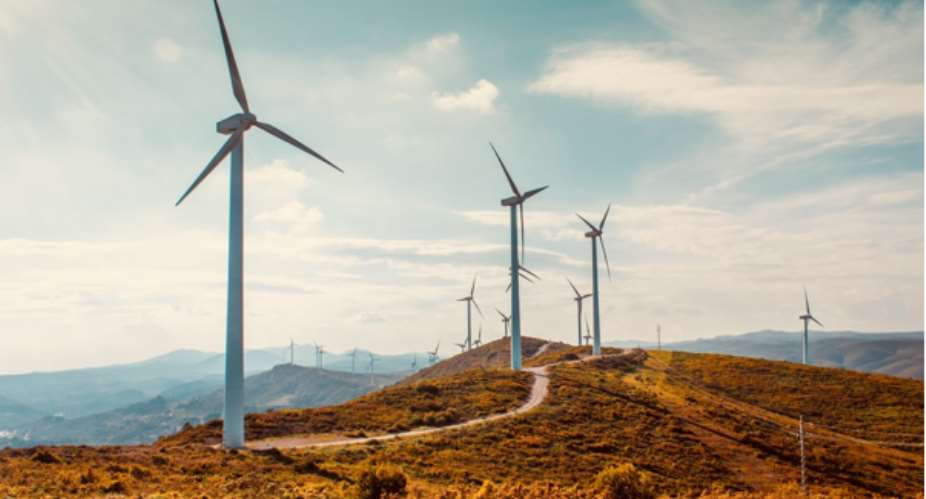As the world reels from the COVID-19 pandemic, the issue of nature is increasingly coming to the forefront, climate change remains another issue that the globe is grappling with. Nonrenewable energy sources accounting for more than 80% of the world’s energy supply are major drivers of climate change, as a result of carbon dioxide and other greenhouse gases produced when they burn.
According to the Intergovernmental Panel on Climate Change (IPCC) fossil fuels contributed 89% of the world’s global CO2 emissions in 2018, underlining the impact of these fuels. Consequently, the world is increasingly moving towards renewable energy sources, with this uptake increasingly significantly in Africa over the last 20 years.
In Ghana, renewable energy is increasingly taking root with major sources including wind, hydropower and solar energy among others. As this demand increases, there is a need to balance these developments with protecting biodiversity. Statistics indicate that millions of birds are killed every year, due to negative interactions with energy developments through electrocution, collisions and the destruction of habitats. Wind turbines and power lines may also act as barriers to the movement of some migratory birds or birds commuting moving between different sites for breeding, feeding and resting. Additionally, these interactions have a negative effect on the power providers and the economy occasioned by high maintenance costs and power outages. Other negative impacts of these developments include displacement from feeding, nesting, roosting areas, and habitat degradation among others.
Consequently, there is need to develop a policy framework to guide these developments. Ghana Wildlife Society (GWS), BirdLife Partner, has been instrumental in various conservation initiatives around the country. GWS has developed a position statement on the deployment of renewable energy programmes and projects, in line with the country’s aspirations.
Ghana’s wind energy infrastructure are currently being installed in areas close to the coastline and wetlands, including areas recognized as a Ramsar site and Important Bird & Biodiversity Area (IBA). Consequently, much will need to be done to safeguard biodiversity amidst these developments. World over, several tools have been developed to ensure that these energy developments are located in suitable areas thus minimizing risk to birds. For example, BirdLife has developed a sensitivity map for vulnerable species and sites which can be instrumental in the planning of energy developments. Environmental assessment tools such as Strategic Environmental Assessments (SEAs) and Environmental Impact Assessments (EIAs) are critical in mapping out potential impact areas for biodiversity at strategic and site-specific levels.
Ghana’s EIAs guideline for the energy sector should be reviewed to reflect current trends & realities and findings from SEAs on the renewable energy sector in the country. With regards to existing energy infrastructure, wind farms and power lines should be monitored regularly and their impact on birds and biodiversity evaluated at the national scale as well as the effectiveness of mitigation measures in place to minimise impacts on birds’ populations.
National legislation and policies, such as the Renewable Energy Act, 2011 (Act 832); the Environmental Assessment Regulations, 1999 (L.I. 1652); the EIA Guideline for the Energy Sector; the National Energy Policy; and the Strategic National Energy Plan (2006-2020), should be updated and enforced.
Most importantly, the involvement of stakeholders in the energy sector including public and private institutions will be critical in initiating dialogue on this issue. GWS will continue engaging with stakeholders in the sector to ensure that biodiversity considerations are taken into account in the development of Ghana’s renewable energy sector development.





 Lay KPMG audit report on SML-GRA contract before Parliament – Isaac Adongo tells...
Lay KPMG audit report on SML-GRA contract before Parliament – Isaac Adongo tells...
 Supervisor remanded for stabbing businessman with broken bottle and screwdriver
Supervisor remanded for stabbing businessman with broken bottle and screwdriver
 NDC watching EC and NPP closely on Returning Officer recruitment — Omane Boamah
NDC watching EC and NPP closely on Returning Officer recruitment — Omane Boamah
 Your decision to contest for president again is pathetic – Annoh-Dompreh blasts ...
Your decision to contest for president again is pathetic – Annoh-Dompreh blasts ...
 Election 2024: Security agencies ready to keep peace and secure the country — IG...
Election 2024: Security agencies ready to keep peace and secure the country — IG...
 People no longer place value in public basic schools; new uniforms, painting wil...
People no longer place value in public basic schools; new uniforms, painting wil...
 'Comedian' Paul Adom Otchere needs help – Sulemana Braimah
'Comedian' Paul Adom Otchere needs help – Sulemana Braimah
 Ejisu by-election: Only 33% of voters can be swayed by inducement — Global InfoA...
Ejisu by-election: Only 33% of voters can be swayed by inducement — Global InfoA...
 Minority will expose the beneficial owners of SML, recover funds paid to company...
Minority will expose the beneficial owners of SML, recover funds paid to company...
 Prof. Opoku-Agyemang has ‘decapitated’ the NPP’s strategies; don’t take them ser...
Prof. Opoku-Agyemang has ‘decapitated’ the NPP’s strategies; don’t take them ser...
